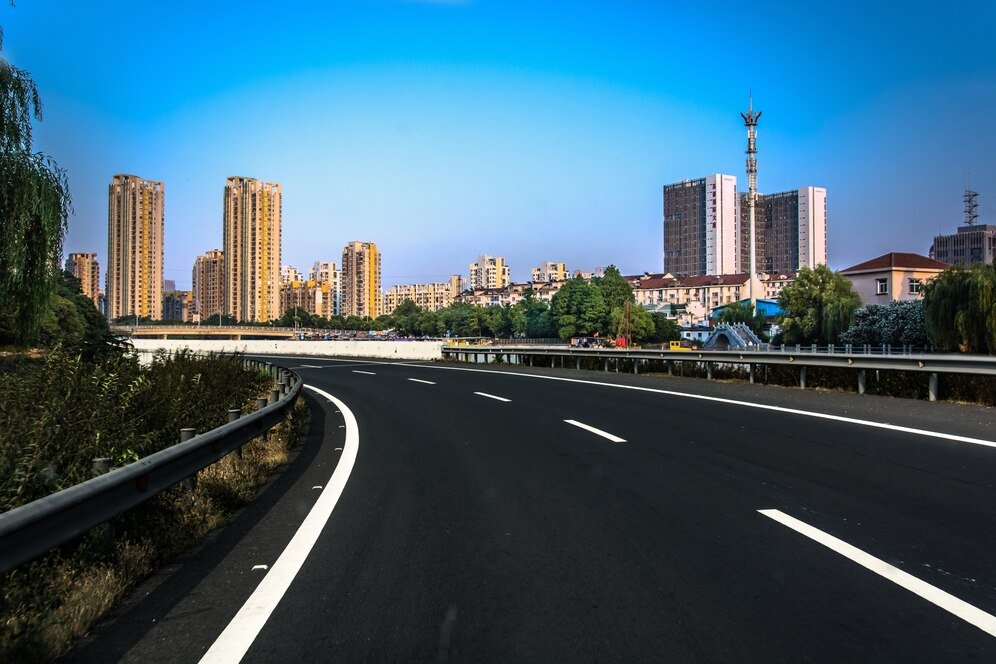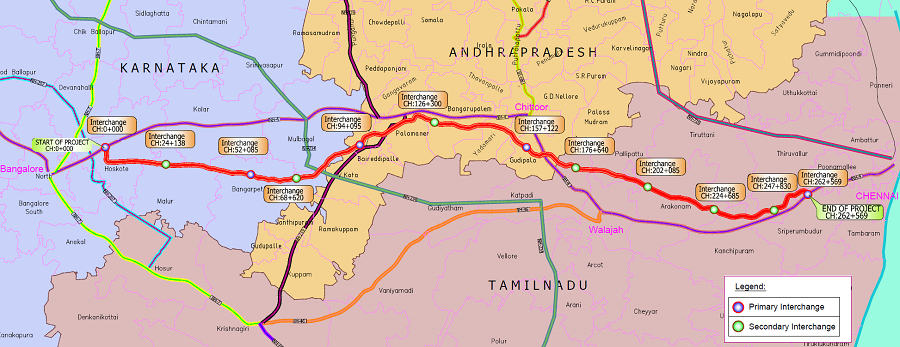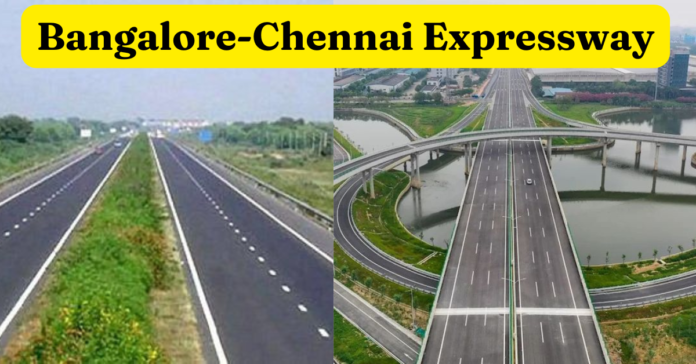Introduction
The Bangalore-Chennai Expressway is set to become South India’s first distinctive expressway, offering a modern travel experience akin to European and American highways. Once completed, this state-of-the-art route will significantly shorten the travel time between Bangalore and Chennai, transforming a lengthy journey into a swift 2-hour experience.
Bangalore-Chennai Expressway Overview
| Detail | Description |
|---|---|
| Total Length | 258 Kilometers |
| Number of Lanes | 4 |
| Estimated Cost | ₹17,930 Crore |
| Starting Point | Hosakote, Bengaluru Rural District, Karnataka |
| Ending Point | Sriperumbudur, Kanchipuram District, Tamil Nadu |
| Expected Completion | 2025 |
Also Read: New Raipur Visakhapatnam Expressway: Route, Benefits & Updates
About the Bangalore-Chennai Expressway
The concept of expressways, once considered a distant dream, is rapidly becoming a reality in India. While Uttar Pradesh currently leads in the development of highways and expressways, the landmark project designed to match international standards. This expressway aims to offer a seamless travel experience between two of India’s major metropolitan areas. With the current distance between Bangalore and Chennai standing at 300 kilometers, the new expressway will reduce this to 263 kilometers. More importantly, it will cut the travel time from around 5 hours to a remarkable 2 hours and 15 minutes.
This expressway is designed with a focus on efficiency, safety, and comfort. It will feature a top speed limit of 120 km/h and include advanced road maintenance systems to ensure smooth traffic flow. The project reflects a significant leap in India’s infrastructure, promising not only speed but also a high level of travel comfort.

Benefits of the Bangalore-Chennai Expressway
Significant Reduction in Travel Time:
The expressway will transform the journey between Bangalore and Chennai, reducing the current travel time of 6-7 hours to just 4 hours. This efficiency will benefit both business and leisure travelers, facilitating faster and more convenient commutes.
Economic Development:
The expressway will bolster economic opportunities in the region. It is expected to generate jobs, particularly in the automotive and infrastructure sectors, enhancing the economic landscape of Karnataka. Additionally, real estate investments in towns along the expressway are anticipated to rise as property values increase due to improved connectivity.
Enhanced Infrastructure:
The expressway will feature essential amenities, including truck bays for freight, underpasses for vehicles and animals, pedestrian walkways, and a comprehensive traffic management system. These features are designed to support smooth and safe travel for all users.
Support for Industrial Growth:
By connecting key industrial hubs, the expressway will promote the Chennai-Bangalore Industrial Corridor, which aims to enhance the manufacturing and industrial capabilities of the region. This will contribute to the overall economic growth and development of South India.
Also Read: Economic Impact of the Bangalore–Vijayawada Expressway
Cost of the Bangalore-Chennai Expressway
The National Highway Authority of India (NHAI) is spearheading the construction of this ambitious project, which is estimated to cost around ₹17,930 Crore. One of the key advantages of this expressway is its potential to reduce logistics costs dramatically. Upon completion, the cost of logistics is expected to decrease from 16% to 6%, resulting in significant savings for businesses and enhancing the economic viability of the corridor.

Source: metrorailguy
Route Details
The Bangalore-Chennai Expressway will span three states: Karnataka, Andhra Pradesh, and Tamil Nadu. It will pass through several towns, including Hoskote, Malur, Bangarapet, Kolar Gold Fields, Venkatagirikota, Palamaner, Bangarupalem, Chittoor, Ranipet, and Sriperumbudur. This route will provide the shortest and most efficient connection between Bangalore and Chennai compared to existing roads such as the Golden Quadrilateral and Old Madras Road.
The new expressway will bypass the longer and more congested routes, making travel not only faster but also safer. The Golden Quadrilateral, which is currently the most commonly used route, extends the distance between the two cities to approximately 380 kilometers. The will offer a significant improvement in both distance and travel experience.
Progress on the Bangalore-Chennai Expressway
Currently, 15% of the construction work has been completed, amounting to 14.4 kilometers. Initially expected to be operational by March 2023, the project is now projected to take an additional 15-18 months due to various factors. Once finished, the expressway will allow vehicles to travel at speeds up to 120 km/h, with a total of 4 lanes facilitating smooth traffic flow.
The expressway will feature a new alignment connecting Hoskote in Bengaluru to Sriperumbudur, located approximately 40 kilometers from Chennai. Union Road Transport Minister Nitin Gadkari has announced that the expressway is expected to be inaugurated by Prime Minister Narendra Modi before December this year. This milestone will mark a significant advancement in India’s infrastructure development, showcasing the country’s commitment to modernizing its transport network.
Also Read: Breaking Down the Ganga Expressway: Features, Progress, and Economic Impact
Conclusion:
The Bangalore-Chennai Expressway is poised to be a transformative project for South India, bringing a modern and efficient travel experience akin to international standards. With its impressive design and state-of-the-art features, this expressway will drastically reduce travel time between Bangalore and Chennai, making the journey swift and comfortable. The project, with its anticipated completion in 2025, promises not only to enhance connectivity but also to drive economic growth and development in the region. As work progresses, the expressway stands as a testament to India’s advancing infrastructure and commitment to improving transportation networks.
Frequently Asked Questions:
The expressway spans a total length of 258 kilometers.
The expressway will feature 4 lanes.
The estimated cost is ₹17,930 Crore.
The expressway is expected to be completed by 2025.
The travel time will be reduced to approximately 2 hours and 15 minutes.
Suggested Articles:
Breaking Down the Ganga Expressway: Features, Progress, and Economic Impact
New Raipur Visakhapatnam Expressway: Route, Benefits & Updates


